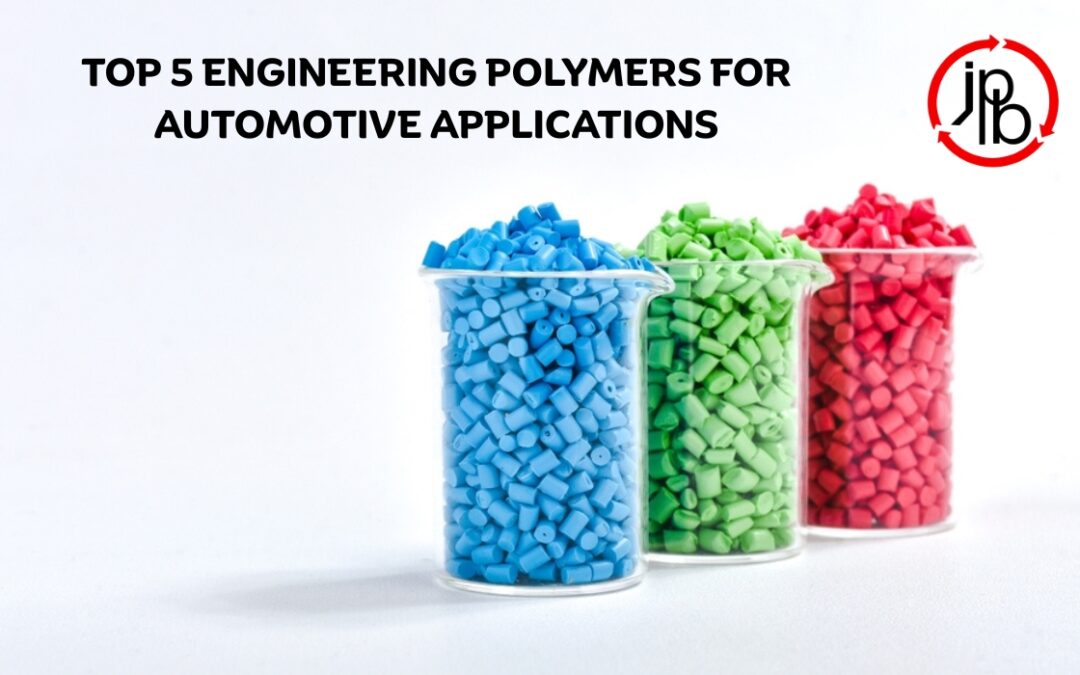In the fast-evolving world of automotive manufacturing, engineering polymers have revolutionized vehicle design and performance. These high-performance materials offer a compelling alternative to traditional metals, providing benefits like reduced weight, enhanced fuel efficiency, corrosion resistance, and cost-effective production. As automakers push towards electrification, sustainability, and advanced driver-assistance systems (ADAS), the demand for reliable engineering polymers has surged. These plastics not only contribute to lighter vehicles, potentially improving electric vehicle (EV) range by up to 10%, but also enable complex geometries through processes like injection molding, reducing assembly time and waste.
At JainPlasticBhandar, we pride ourselves on being the best plastic raw material supplier in Delhi, sourcing premium-grade polymers that meet stringent OEM specifications. With decades of experience, our commitment to quality and timely delivery makes us the go-to partner for automotive fabricators across India. Whether you’re developing under-the-hood components or interior trims, our extensive inventory ensures you get the right material for innovation without compromise.
This article explores the top 5 engineering polymers for automotive applications, highlighting their properties, key uses, and why they’re indispensable. From polyamides to polybutylenes, these materials are driving the industry forward, and as the top plastic raw material supplier in Delhi, we’re here to supply them at competitive rates.
1. Polyamide (PA/Nylon): The Versatile Workhorse
Polyamide, commonly known as Nylon, stands as one of the most widely used engineering polymers in the automotive sector due to its exceptional mechanical strength and thermal stability. Available in variants like Nylon 6 and Nylon 6/6, PA is a semi-crystalline thermoplastic renowned for its high tensile strength (up to 80 MPa), wear resistance, and ability to withstand temperatures exceeding 150°C. Its low friction coefficient makes it ideal for moving parts, while additives like glass fiber reinforcement can boost its stiffness by 50%, minimizing water absorption issues that affect dimensional stability.
In automotive applications, Nylon shines in under-the-hood environments where heat, chemicals, and vibration are constant challenges. It’s extensively used for engine covers, air intake manifolds, and fuel system components like fuel caps and lines, where it reduces weight by 40-50% compared to aluminum equivalents. Door handles and gears also benefit from its durability, ensuring long-term performance without cracking under stress. In electric vehicles, Nylon’s electrical insulation properties support battery enclosures and wiring harnesses, enhancing safety in high-voltage systems.
The advantages of PA extend to sustainability; it’s recyclable and can incorporate bio-based fillers for lower carbon footprints. However, its hygroscopic nature requires careful processing to avoid brittleness. At JainPlasticBhandar, we offer virgin and compounded Nylon grades tailored for automotive OEMs, ensuring compliance with standards like ISO 527 for tensile testing. As the best polymer distributor in India, our supply chain minimizes lead times, helping you accelerate prototyping and production.
2. Polycarbonate (PC): Transparency Meets Toughness
Polycarbonate (PC) is a go-to engineering polymer for applications demanding optical clarity and impact resistance, making it a staple in modern vehicle aesthetics and functionality. This amorphous thermoplastic boasts an impact strength of over 800 J/m—12 times that of acrylic—while maintaining transparency levels up to 90%. With a heat deflection temperature around 140°C and inherent UV resistance when stabilized, PC excels in both interior and exterior exposures, resisting yellowing from prolonged sunlight.
Automotive designers favor PC for headlamp lenses, taillights, and sunroofs, where its clarity ensures optimal light transmission without distortion. In safety-critical areas, it’s molded into bulletproof glazing and protective shields for ADAS sensors like LiDAR housings. Under-the-hood, glass-fiber-reinforced PC forms engine covers and cooling ducts, balancing rigidity with lightweighting to cut vehicle mass by 20-30%. Its flame-retardant grades (UL94 V-0) are vital for electrical connectors in EVs, preventing short circuits.
PC’s processability, via extrusion or thermoforming, allows for intricate designs, like curved panoramic roofs that enhance cabin spaciousness. Though sensitive to solvents, coatings mitigate scratches, extending lifespan. JainPlasticBhandar stocks high-grade PC resins from global leaders, certified for automotive use under SAE J-2550. As your trusted top plastic raw material supplier in Delhi, we provide customized blends for flame retardancy or impact enhancement, empowering your designs with unmatched reliability.
3. Acrylonitrile Butadiene Styrene (ABS): Strength in Style
Acrylonitrile Butadiene Styrene (ABS) blends the rigidity of acrylonitrile, toughness of butadiene, and processability of styrene, creating a balanced engineering polymer that’s tough yet moldable. With a tensile strength of 40-50 MPa and excellent dimensional stability, ABS resists warping under thermal cycling and offers good electrical insulation. Its surface finish accepts plating or painting seamlessly, adding aesthetic value without extra steps.
In the automotive realm, ABS dominates interior components like dashboards, door panels, and center consoles, where its impact resistance absorbs daily knocks and vibrations. Exterior wheel covers and body trims leverage its weatherability, while under-body applications include fender liners that shield against road debris. In EVs, ABS encases infotainment systems, combining durability with low smoke generation in fires.
Blends like PC/ABS elevate performance for structural parts, offering 20% higher heat resistance for HVAC housings. Recyclable and cost-effective, ABS supports circular economy goals by reprocessing scrap without quality loss. Challenges like UV degradation are addressed with stabilizers. JainPlasticBhandar, the best plastic raw material supplier in Delhi, curates ABS variants for injection molding, ensuring bubble-free parts and adherence to ASTM D638 standards. Our expertise as the best polymer distributor in India means seamless integration into your supply chain for high-volume runs.
4. Polyoxymethylene (POM/Acetal): Precision Under Pressure
Polyoxymethylene (POM), or Acetal, is a crystalline engineering polymer prized for its low friction and high precision, making it indispensable for dynamic automotive parts. With a tensile strength of 60-70 MPa, exceptional fatigue resistance, and a coefficient of friction as low as 0.1, POM maintains tight tolerances (±0.05 mm) even after repeated cycles. Its chemical resistance to fuels and oils, coupled with a service temperature up to 100°C, suits harsh environments.
POM finds prime use in fuel system components like pump inserts and vapor valves, where its dimensional stability prevents leaks. Gears, bushings, and seat belt mechanisms benefit from its self-lubricating nature, reducing noise and wear in transmissions. Interior trims and exterior locks also employ POM for snap-fit assemblies that endure impacts without fracturing.
In hybrid vehicles, its low moisture absorption (0.2%) ensures consistent performance in humid climates. Though notch-sensitive, annealing post-molding enhances toughness. As the top plastic raw material supplier in Delhi, JainPlasticBhandar delivers unfilled and filled POM grades, optimized for CNC machining or extrusion. Our role as the best polymer distributor in India guarantees traceability from resin to part, supporting your pursuit of zero-defect manufacturing.
5. Polybutylene Terephthalate (PBT): Electrical and Thermal Champion
Polybutylene Terephthalate (PBT) is a semi-crystalline polyester engineering polymer excelling in electrical insulation and thermal endurance, ideal for electrified automotive systems. Offering a dielectric strength over 15 kV/mm and heat deflection up to 200°C, PBT resists hydrolysis and maintains rigidity (modulus 2.5-3 GPa) under load. Its low shrinkage (0.5%) during molding ensures precise geometries for connectors.
In vehicles, PBT powers electrical housings, plug connectors, and sensor modules, where arc resistance prevents failures in wiring harnesses. Bumpers and door handles utilize its impact toughness, while under-hood relays and ignition coils leverage chemical inertness. In EVs, PBT-clad battery management systems handle thermal runaway risks effectively.
Glass or mineral-filled variants boost strength by 30%, enabling metal replacement in fuses. Sustainable PBT from recycled PET bottles aligns with green initiatives. Sensitivity to alkaline cleaners is mitigated by barriers. JainPlasticBhandar, your best plastic raw material supplier in Delhi, supplies hydrolysis-stabilized PBT for demanding specs like UL 746C. As the premier best polymer distributor in India, we facilitate just-in-time deliveries to keep your assembly lines humming.
Conclusion: Partnering for Automotive Excellence
The top 5 engineering polymers- Polyamide, Polycarbonate, ABS, POM, and PBT; form the backbone of modern automotive innovation, enabling lighter, safer, and more efficient vehicles. By replacing metals, they slash emissions and costs while opening doors to smart designs. Yet, their true potential hinges on sourcing from reliable partners who understand quality and consistency.
At JainPlasticBhandar, we’re more than a supplier; we’re your strategic ally in polymer procurement. As the best plastic raw material supplier in Delhi, we offer unparalleled access to certified materials, backed by technical support for custom compounding. Our nationwide network positions us as the top plastic raw material supplier in Delhi for pan-India projects, and our dedication to ethical sourcing cements us as the best polymer distributor in India.
Whether scaling production for EVs or refining legacy parts, contact us today to elevate your automotive applications. With JainPlasticBhandar, innovation drives forward, literally.

